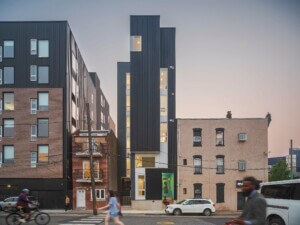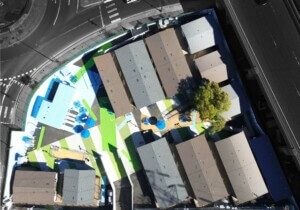When Silicon Valley Bank (SVB) collapsed late last week, it left more than just investors, lenders, and financial institutions quavering and on edge. Just 48 hours later New York–headquartered bank Signature announced its closure in what has become the third-biggest bank failure in U.S. history. Among SVB’s clients were a host of innovative tech startups and software makers, as well as residential solar panel companies and affordable housing projects. Half of Signature’s lending was to real estate companies and developers with extensive portfolios in commercial buildings and multifamily housing.
While the SVB collapse felt sudden, financial experts say it was actually years in the making. Back when interest rates were near-zero, SVB funneled money into government bonds and when interest rates rise, as they have significantly in the last year, bond prices fall. This in turn makes borrowing costs for loans higher. On March 10, SVB clients withdrew their money in large sums, and the bank ran out of money.
The demise of Signature Bank, headquartered in New York, is a result of the manic and panic set off by the SVB collapse, but also an outcome of a bank too focused on cryptocurrency.
A joint statement from the U.S.Treasury Department, Federal Reserve, and Federal Deposit Insurance Corporation (FDIC) on Sunday, March 12, ensured depositors they would have access “to all of their money” put into SVB and also announced “a similar systemic risk exception for Signature Bank.”
The repercussions of these two recent bank collapses extend beyond that of financial institutions and affect clients who depend on the banks to manage assets and provide loans. For SVB, this is a long roster of tech startups, established tech companies, and life science and biotech businesses. Among these are several residential solar companies including Sunrun, Sunnova Energy, and Sunlight Financial Holding.
As reported by Bloomberg and The San Francisco Standard, SVB also had a number of low-income housing developers as clients. Among the projects impacted was The Kelsey, a 112-unit affordable housing community in San Francisco that was ready to close its deal on Friday but was left hanging: Its $52 million construction loan was to be handled by SVB. In a tweet Micaela Connery, cofounder and CEO of The Kelsey, said “Silicon Valley Bank collapse impacts more than billionaires and bank execs.” She added that the project would find another lender, but would now be delayed in its mission to provide housing to individuals with disabilities.
In its 2022 Environmental, Social and Governance Report, SVB stated it intended to invest over $1 billion into residential mortgages for low- and moderate-income housing in Massachusetts and California by 2026.
Similarly, Signature’s fall will also be felt within the housing and built environment sectors, as it is one of New York City’s largest multifamily mortgage lenders. According to the University Neighborhood Housing Program’s Building Indicator Project, which tracks lenders, the bank’s portfolio includes 3,000 multifamily buildings with around 80,000 tenants.
According to regulatory files examined by The Real Deal just about half of the bank’s total loans, an amount totaling $36 billion, involved real estate. Signature bank has dealt with big players in real estate and local landlords. A 2018 New York Times article reported Signature was the “go-to-lender” for Donald Trump and his family. It helped finance the Trump International Golf Club in Florida. The bank also made headlines in 2019 when several of its landlord clients appeared on the New York City Public Advocate’s “worst landlords” list, cited for having building violations at their properties. In the past the bank had been called out by the Association for Neighborhood & Housing Development (ANHD) for its lending practices.
In a statement published on March 13, the ANHD said: “Signature Bank’s collapse comes as no surprise to the Association for Neighborhood & Housing Development (ANHD), who has long called out their faulty business model, which relied on predatory and speculative activities in New York City. Signature paved the way for thousands of tenants to suffer living in unsafe conditions, the victims of harassment, or displaced from their homes and communities.”
Among Signature’s more recent real estate dealings, are a $155 million refinancing loan for 777 Third Avenue, an office tower in Manhattan; and a $127.5 million refinancing loan for a newly constructed multifamily complex in Astoria, Queens.
On Monday, the FDIC transferred all SVB deposits into a new full-service FDIC-operated “bridge bank,” a chartered national bank that operates under a board appointed by the FDIC. It did the same with Signature, forming Signature Bridge Bank, N.A.
Today the U.S. Justice Department announced it has opened an investigation into the collapse of SVB.
AN will continue to monitor this story for its ties to how the financing of buildings and technologies will be affected by the failures of SVB and Signature.











